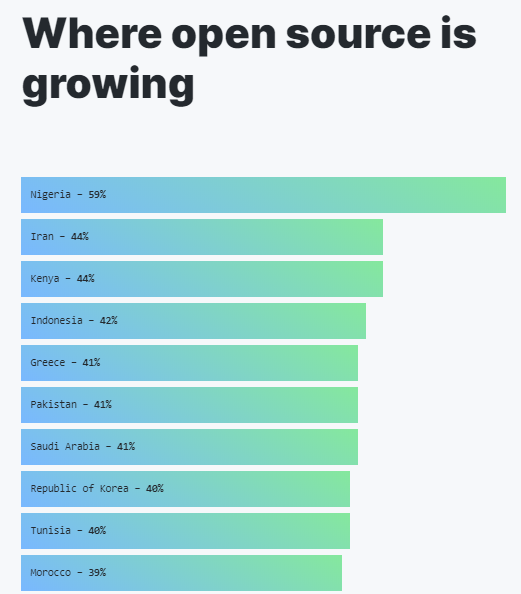What's the state of coding and developer jobs in Nigeria?
Insights into the coding tools and programming languages to learn, how employers think of skills, compensation, work flexibility and experience, and the state of the developer community.

Programming has boomed in the past decade in Nigeria. Its tremendous growth is captured not only by the sheer number of hackathons, conferences and startups founded in the past years, but also by the contribution of the ICT sector to Nigeria's GDP growth.
Most notably, in the second quarter of 2019, the Information and Communication Technology (ICT) sector contributed more (13.85%) to Nigeria's Gross Domestic Product (GDP) than the Oil and Gas sector (8.8%)—the mainstay of the Nigerian economy. Dr Isa Ali Ibrahim Pantami, Minister of Communications and Digital Economy, says: "If the figures released by the National Bureau of Statistics (NBS) is anything to go by, then it [the ICT sector] will more than double the Oil and Gas contribution [to the GDP] in two years".
> Related article: [Why we should all learn to code?](https://www.benjamindada.com/tech-daily-learning-to-code/)Also, the October 2019 name-change of the Ministry of Communications to Federal Ministry of Communications and Digital Economy further emphasizes the progress recorded in the ICT sector. The change of name expands the mandate of the Ministry of Communications, which already supervises the ICT sector, "to capture the goals of digitalisation of the Nigerian economy in line with the Economic Growth and Recovery Plan (ERGP)".
In short, while Nigeria's position as the giant of Africa has been largely theoretical across major sectors (to the extent it can't enforce ECOWAS trade protocol), the ICT sector has been the beacon of hope. Nigerian tech bros have not only put the country on the global stage through the exportation of technical talents, they have also attracted more tourists than the Federal Ministry of Information and Culture (à la Jack Dorsey, Sundar Pichai and Nat Friedman) and generated huge foreign direct investment through funding rounds.
> Related Article: [Why CEOs of global tech companies visit Nigeria and the outcome of their visit](https://www.benjamindada.com/jack-dorsey-twitter-square-ceo-visit-nigeria-africa/)Surprisingly, or rather unfortunately, the state of tech professionals (developers, designers, product managers, etc.) in Nigeria is not enviable.
Despite the contribution of the ICT sector to Nigerian economy, tech professionals are among the most at-risk groups in the country. They are at risk of being assaulted by the infamous Special Anti-Robbery Squad Division (SARS) of the Nigeria Police Force.

But in typical Nigerian (human) spirit, developers must flourish in spite of this challenge. To help in doing that, these are some insights into the programming tools and languages to learn, how employers think of skills, compensation, work flexibility and experience, as well as the overall pulse of the developer community.
# 10 Actionable Insights for Nigerian Developers in 2020 and BeyondThe insights are grouped into three parts, namely: employment-related, developer community-related, tools and programming languages.
A. State of Programming Jobs in Nigeria
1. No love lost between junior developers and employers
It is quite obvious, as Andela has shown, that employers are only willing to pay higher when a developer has more experience, according to the latest State of Code released by Devcenter—a software development talent company.
Devcenter, on its jobs platform—Gigson, revealed that while employers are reluctant to disclose remuneration (37% of all jobs on Gigson are tagged 'competitive'), the largest specified remuneration group is ₦80,000—₦150,000 ($220—$410) for junior developer roles. This remuneration, although it is 62.5% higher than the minimum wage, is just as low as what was reported in the 2017 State of Code.
Meanwhile, as of 2017, Nigerian developers (including senior developers) were earning lower than their counterparts in South Africa.

2. Back-end developers are becoming front-runners
Pardon the pun, but you get the gist: back-end developers are in high demand.
According to the State of Code, 31% of all job postings on Gigson were for backend-developers. Followed by job postings for front-end developers (24%), mobile developers (22%) and full stack developers (20%).
While generalists have a place in the techosystem, as only 3% of employers on Gigson sought developers to do multiple roles, specialization places premium on a developer.
3. Designers, data scientists and product managers are rising
Until recently, designers, data scientists and product managers were the unsung heroes in the techosystem. And there's been an increase in the number of communities dedicated to educating organisations and individuals on the importance of design thinking, data and agile methodology.
> See Also: [28 tech communities for developers, designers and product managers](https://www.benjamindada.com/tech-communities-career-ng/)In its latest report, Devcenter noted that many tech companies have become more empathic and attuned to design thinking. And as such, these companies build their solutions and services around the user. In 2019 alone, 12% of all the jobs posted on Gigson were designer jobs.
Similarly, in its latest Octoverse report, GitHub noted that there is "a speedily-expanding community of data science professionals and hobbyists" on it platform, which hitherto was a haven for software developers.
4. Lagos is still the centre of excellence
Forget the 2019 Global Liveability Index that says Lagos is the second-worst city to live in the world. The commercial capital of Nigeria is still the centre of excellence when it comes to tech jobs.
> Related Article: [PlentyWaka wants to decongest Lagos roads with bus-sharing service](https://www.benjamindada.com/plentywaka-introduces-vehicle-partnership-wakapurse/)According to the latest Global Startup Ecosystem Report, Lagos has the potential of becoming one of the top 30 startup ecosystems in the world by 2024. Also, as São Paulo is the leading startup ecosystem in South America, Jakarta in Southeast Asia, Lagos is the regional leader in Africa.
In the same vein, 91% of all job postings on Gigson were in Lagos. Devcentre noted that tech jobs in other cities are growing, but not as fast as Lagos.
However, due to the seemingly oversaturation in Lagos, tech companies are beginning to explore other cities for growth. For instance, SafeBoda launched in Ibadan instead of Lagos.
5. Employers are not a fan of remote work
If Lagos, where people spend an average of 65 days in traffic yearly, is the centre of excellence per tech jobs, embracing remote work ought to be a no-brainer. But employers are not a fan of remote work.
Due to concerns about electricity and stable internet connectivity, employers prefer their developers to work from the office. The State of Code report shows that 56% of all job postings on Gigson are full-time, physical jobs.
6. The rise of contracts and gig economy
Conversely, more tech companies are recruiting developers for shorter periods. 19% of all jobs posted on Gigson in 2019 were for contract roles.
B. Developer community
7. Open source is a big deal in Nigeria
Nigerian developers has the highest growth in open source projects created in public repositories on GitHub.

8. The growing developer community in Africa
Nigeria moved one spot to become the third fastest-growing developer community on GitHub, ahead of Egypt and South Africa. Atop the list are Morocco and Kenya in first and second positions, respectively.
C. Programming tools and language
9. Flutter is the language to learn
The overarching industry trend is that Flutter will become more popular in 2020.
Brad Traversy, a renowned full stack web developer and instructor, recommends Flutter for anyone that wants to try out mobile app development. The Flutter framework uses Dart—an obscure language that's somewhere between Java and JavaScript, Brad says.
Also, Flutter is the fastest growing open source project and Dart is the fastest growing programming language on GitHub.
10. Don't forget the basic necessities
Lastly, a reminder: you neither need a supercomputer nor be a genius to become a software developer.
Brad says: "It's not like game engine development or something like that, so you can use a mid-range laptop, or even in some cases a lower-end computer." There have been instances of people going from programming on a feature phone to working with international tech companies.







Comments ()